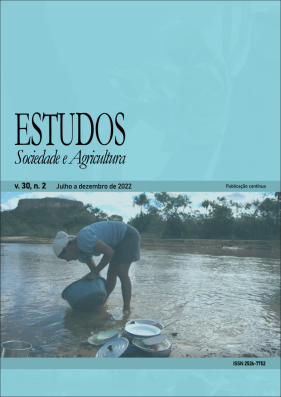The decline of sugar agribusiness in the Brazilian Northeast and access to the peasant condition
DOI:
https://doi.org/10.36920/esa-v30-2_st03Keywords:
sugarcane agribusiness, agrarian reform, NortheastAbstract
This article presents theoretical and methodological considerations on research related to the social reconversion of families living on land pertaining to sugar mills residents (both agricultural workers and rural mill staff) to agrarian reform settlers. This is an ongoing work based on the empirical bankruptcy of the Santa Maria mill in the Brejo region of Paraíba, Brazil, and points to the issue of reconstructing subjective worlds imposed by new experiences through the concept of "uprooting" and how to overcome this challenge, questions that are central to the work of Pierre Bourdieu.
elocation-id: e2230208
Received: Jul.10.2022 • Accepted: Oct.19.2022 • Published: Dec.7.2022
Original article / Double-blind peer review / Open access
Downloads
Downloads
Published
Issue
Section
License
Copyright (c) 2022 Patrícia Alves Ramiro

This work is licensed under a Creative Commons Attribution 4.0 International License.
Authors who publish in this journal agree to the following terms:
a) Authors maintain the copyright and grant the journal the right of first publication, with the work simultaneously licensed under the Creative Commons Attribution License which allows the sharing of the work with acknowledgment of authorship and initial publication in this journal.
b) Authors are authorized to take additional contracts separately, for non-exclusive distribution of the version of the work published in this journal (eg publish in institutional repository or as a book chapter), with acknowledgment of authorship and initial publication in this journal.
c) Authors are allowed and encouraged to publish and distribute their work online (eg in institutional repositories or on their personal page) at any point before or during the editorial process, as this can generate productive changes, as well as increase the impact and citation of published work (See The Effect of Free Access).






